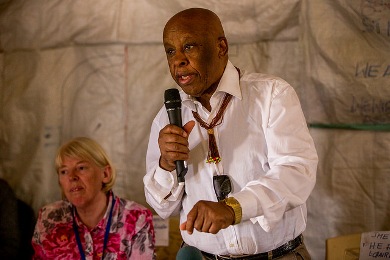Head of peace monitoring commission in S. Sudan urges internal economic reforms
March 9, 2016 (JUBA) – Festus Mogae, head of the Joint Monitoring and Evaluation Commission (JMEC), has called on South Sudan’s rival parties to undertake radical economic measures to reform the economy of the country instead of placing too much hopes on foreign intervention to elevate suffering and deteriorating economic situation in the country.

The body which is representative of all rival parties and observers is chaired by Mogae, former Botswana president. It monitors the implementation of the peace deal signed in August last year between President Salva Kiir’s government and the armed opposition faction of the Sudan People’s Liberation Movement (SPLM-IO) led by the first vice president designate, Riek Machar.
Mogae, who delivered a prepared speech at the joint session of the JMEC on Wednesday in the national capital, Juba, explained that the economic situation in the country was deteriorating and was hurting mostly the poor and ordinary South Sudanese without or with little income.
“The idea that world powers will restore this country’s economy to what it once was is unrealistic. Oil prices may rise, or they may not. Irrespective of whether they do or not, this cannot be counted on. Solutions must be found from within,” he said.
He referenced the parts of the peace agreement which deal with economic reforms, stressing that these require the formation of a Transitional Government of National Unity (TGoNU) as stipulated in the agreement.
He however pointed out that formation of the transitional unity government would not be the solution to the deteriorating economy without exhibiting political will and desire for reforms.
“But formation of the government will itself be insufficient to ensure international economic assistance. Help will be dependent on the competence of those who are appointed to key economic management positions, on the degree of adherence to the agreement’s provisions, and the seriousness with which appropriate economic policies and necessary reforms are pursued,” he said.
The former Botswana president recommended that the parties come out to discuss steps they would take immediately to help the economy.
“Since the Transitional Government is not yet formed, I would encourage the Parties represented here to consider what action can be taken immediately, today, as well as what action can be immediately taken upon formation of the Transitional Government.”
In the matter of economic reform, he added, the timelines in the agreement may have been overtaken by events, emphasizing there is urgency of the situation which requires further cooperation, and, as with the humanitarian dimension, practical and decisive action.
He said JMEC was willing to assist the parties in whatever way it could to consider what steps could be taken to mitigate further economic decline.
There are concerns that the economic situation in South Sudan is fast deteriorating, sending chilling fears of uncertainty in the country.
(ST)
